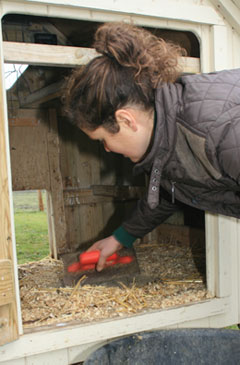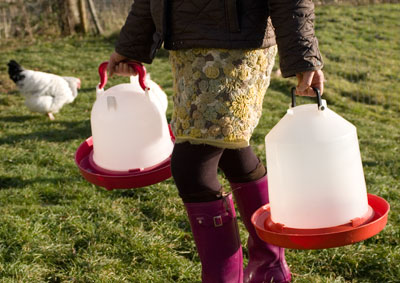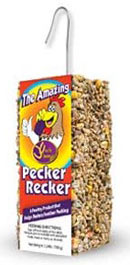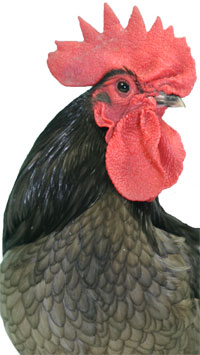Stress is a major contributor to ill health in chickens and can also make them more prone to a number of vices such as feather picking, egg eating, comb or vent pecking.
Chickens kept in intensive conditions are constantly subjected to stress which is why farmers see such high mortality rates and have to pay out to keep birds healthy and make them productive. Fortunately, keeping chickens in our back garden isn’t exactly intensive as long as they have a sufficiently large run or are let out of their run regularly to free-range although there are pleanty of other times when chickens can suffer from stress.
In short, stress is best avoided whenever possible and a little bit of care and forethought can dramatically reduce stress in your birds.
So how do we know what stresses chickens? Well, some years ago, there were studies done that measured the stress hormone ‘corticosterone’ of birds in different situations and it is this research that has enabled us to understand the stressors.
Stressors.
As well as intensive conditions causing stress, the other main stressors can seem quite trivial to us.
- Handling. This is one of the biggest stressors. Chickens are a prey species so naturally, if caught and picked up, they become stressed. Whilst regular handling is important for health checks, chasing a bird around a run for 5 minutes every time will not help. Try to catch birds in a confined area such as a house quickly and calmly. Hold the wings firmly and then transfer the bird to the holding position with your right hand underneath her, breast in the palm of your hand, fingers holding the tops of the legs. Her head should be underneath your arm so her head is looking behind you. Use your left hand to examine her.
- Introducing new chickens. Chickens are flock animals that have a pecking order. It is thought the ancestors to our chickens, the Red Jungle Fowl of South East Asia use the pecking order to assist in their survival. If every bird has her place, when it comes to feeding time, each one can have her turn and they don’t have to spend precious time arguing which may alert predators to their where-abouts. Every hen knows her place in the pecking order and by introducing new birds, the pecking order is upset. No hen knows where she stands and this will cause arguments and considerable stress for days until they have sorted themselves out into a ‘new flock’.
- Lack of food or water. This stress is completely avoidable of course but we all have those one off days when we suddenly realise that our birds have run out of water for one reason or another. A leaky water container, frozen water or just a forgetful moment!
- Extreme heat. Chickens don’t sweat. To cool down, a chicken must either take on cool water (and excrete more to lose the excess fluids and some heat) or pant which removes heat through the air they exhale. Chickens are much better equipped to deal with the cold and can keep their body temperature up by eating more and trapping air inside their feathers to insulate themselves thermally. Heat will cause chickens to become stressed.
- A new environment. This can be taking a bird to a show, getting your birds for the first time or just moving them to a different house or run. Another environmental change that is hard to avoid but causes considerable stress for your birds is when there has been a covering of snow.
- Egg laying. This is surprising since this is a natural things that chickens do but egg laying does cause stress on your hens. Giving them a peaceful, private, darkened nest box can help. Try not to disturb hens that are in the process of laying.
- Predation. Foxes or other predators visiting the garden on a regular basis are likely to cause stress. In the extreme case, after a fox attack, even though a chicken may survive the wounds inflicted by a fox (he grabs a mouth full of her feathers for example and the chicken escapes), she can still die because of the stress.

If you can minimise stress, your birds will be less prone to picking up disease which is something we would all like: happy, healthy chickens!






Hi wanted to know if you have seen any chickens doing this. My speckley hen this morning started to pick up straw and twigs and put them on to her back, apart from this she is fine, any idea why she did that.Also my light sussew is still broody ” weeks, i have stopped letting her go in the egg boxs by making sure the other ones have layed then shutting the door, but she is not happy, and is attacking the other 4 and making a lot of noise, is it ok for me to do this , and if so how long should I do it for, thanks .
I haven’t seen this although it sounds like bloodiness / nest building.
The broody should be broken… It’s not healthy for her to remain broody for so long as she will lose condition. If you have a dog crate, pop her in this during the daytime with just a wire floor, no nesting material. A cold concrete floor is the best in a garage or similar. Provide food and water. After a few days, she should stop being broody.
I have 7 birds 3 warrens 2 light sussexs 1white leghorn and one skyline , both the the leghorn and the skyline have just stopped laying , they are both 33 weeks old and have been upto now laying about every other day , any idears why ?
It’s most likely to be the time of year. The daylight hours have decreased and hens will rest during this time, starting again in the summer months.
Hi, I am new to backyard chickens and new to your site. I have eight hens. 2 legghorns, 3 gold sex links, 2 black sex links, and one RI red. We got them on Good Friday and we started getting eggs on July 21st. We got up to almost six eggs a day up until a couple of weeks ago then nothing…. Our hens are in a 8×24 run with a house a three nesting boxes. We let them free-range several times a week after we get home from work. We did have children over a couple times and they liked to chase and pick up the hens. Do you think we stressed them out and how long will it take for them to lay again. We did start getting 2 eggs daily three days ago but we should be getting 6-7 eggs I think. Thank you for any help .
It is that time of year I’m afraid. The daylight hours have decreased and chickens stop laying.
They should come into lay again in early February if they are a productive breed.
Broody hens – one or two of our 3 occasionally go broody for about 3-4 weeks, but we found that by just taking them out of the nesting box when we let the others out for a run round, they seem to be okay for about half an hour before they want to go back in. we do this about twice a day and they snap out of it eventually, and in the meantime they run round and have fun in the garden as normal.
I also have quesions if anyone can help – one of the hens ( purebred bantams) has always laid soft eggs , but now has ceased laying altogether. Only got them about a year ago. We follow all the right dietary recommendations. any other suggestions?
Also we never see them fighting, but one of them often has a small square pecked bare on her back, and this is exactly as far back as she herself can reach with her beak. but we never see her pecking them out, but what could it be?? Also all 3 often have bare patches on their necks under the beak. To be fair they are moulting right now, but not much. Any ideas?
It sounds like they are moulting – and this is the right time of year too. They will stop laying when they moult and at this time of year, most hens have stopped laying for the winter anyway. They will start again when the daylight hours increase, usually end of January / early February.
If the bald patches don’t regrow over the next 6 weeks, then one of them is feather picking, but check obvious things like hens putting their necks through the wire to reach grass too. Feather picking can be due to boredom, lack of protein (quite common during the moult when feathers are re-growing) or from bullying.